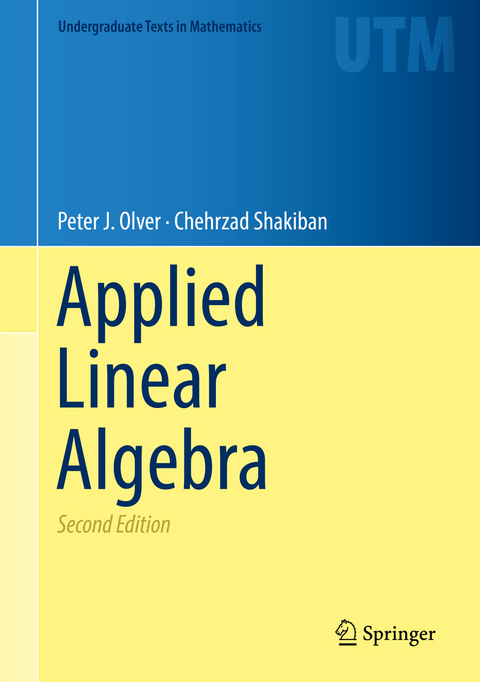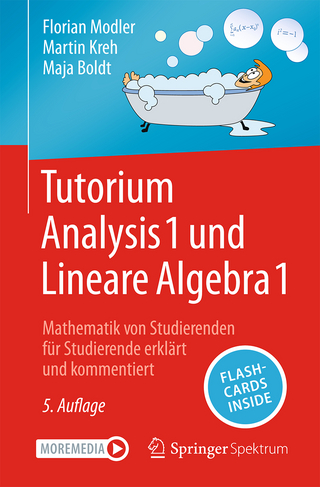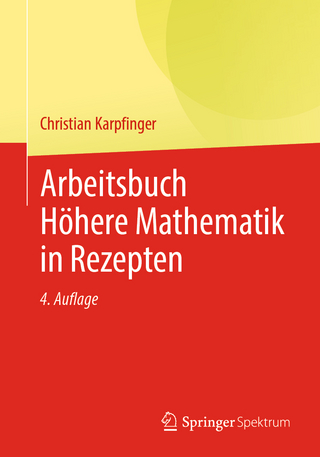
Applied Linear Algebra
Springer International Publishing (Verlag)
978-3-319-91040-6 (ISBN)
This textbook develops the essential tools of linear algebra, with the goal of imparting technique alongside contextual understanding. Applications go hand-in-hand with theory, each reinforcing and explaining the other. This approach encourages students to develop not only the technical proficiency needed to go on to further study, but an appreciation for when, why, and how the tools of linear algebra can be used across modern applied mathematics. Students may visit the following website to obtain the freely available student solutional manual: https://www-users.cse.umn.edu/~olver/ala.html.
Providing an extensive treatment of essential topics such as Gaussian elimination, inner products and norms, and eigenvalues and singular values, this text can be used for an in-depth first course, or an application-driven second course in linear algebra. In this second edition, applications have been updated and expanded to include numerical methods, dynamical systems, data analysis, and signal processing, while the pedagogical flow of the core material has been improved. Throughout, the text emphasizes the conceptual connections between each application and the underlying linear algebraic techniques, thereby enabling students not only to learn how to apply the mathematical tools in routine contexts, but also to understand what is required to adapt to unusual or emerging problems.
No previous knowledge of linear algebra is needed to approach this text, with single-variable calculus as the only formal prerequisite. However, the reader will need to draw upon some mathematical maturity to engage in the increasing abstraction inherent to the subject. Once equipped with the main tools and concepts from this book, students will be prepared for further study in differential equations, numerical analysis, data science and statistics, and a broad range of applications. The first author's text, Introduction to Partial Differential Equations, is an ideal companion volume, forming a natural extension of the linear mathematical methods developed here.
Peter Olver is Professor of Mathematics at University of Minnesota, Twin Cities. His research centers around Lie groups, differential equations, and various areas of applied mathematics. His previous books include Introduction to Partial Differential Equations (Springer, UTM, 2014), and Applications of Lie Groups to Differential Equations (Springer, GTM 107, 1993).
Preface.- 1. Linear Algebraic Systems.- 2. Vector Spaces and Bases.- 3. Inner Products and Norms.- 4. Minimization and Least Squares Approximation.- 5. Orthogonality.- 6. Equilibrium.- 7. Linearity.- 8. Eigenvalues.- 9. Linear Dynamical Systems.- 10. Iteration of Linear Systems.- 11. Boundary Value Problems in One Dimension.- References.- Index.
| Erscheinungsdatum | 14.06.2018 |
|---|---|
| Reihe/Serie | Undergraduate Texts in Mathematics |
| Zusatzinfo | XXV, 679 p. 130 illus., 88 illus. in color. |
| Verlagsort | Cham |
| Sprache | englisch |
| Maße | 178 x 254 mm |
| Gewicht | 1663 g |
| Themenwelt | Mathematik / Informatik ► Mathematik ► Algebra |
| Mathematik / Informatik ► Mathematik ► Angewandte Mathematik | |
| Naturwissenschaften ► Physik / Astronomie | |
| Schlagworte | Applied linear algebra • Dynamical Systems • Eigenvalues and Eigenvectors • Eigenvalues and singular values • Equilibrium • Inner products • Inner products and norms • linear algebra • linear algebra textbook • Linear iterative systems • linear systems • matrix theory • Peter Olver textbook • Principle Component Analysis • vector spaces |
| ISBN-10 | 3-319-91040-X / 331991040X |
| ISBN-13 | 978-3-319-91040-6 / 9783319910406 |
| Zustand | Neuware |
| Informationen gemäß Produktsicherheitsverordnung (GPSR) | |
| Haben Sie eine Frage zum Produkt? |
aus dem Bereich


